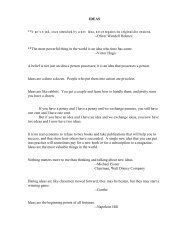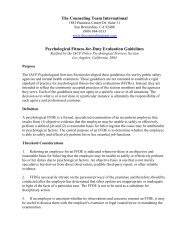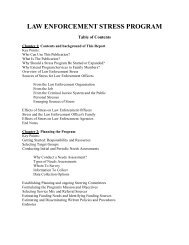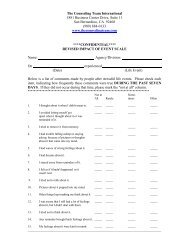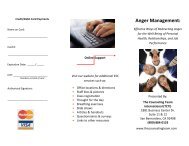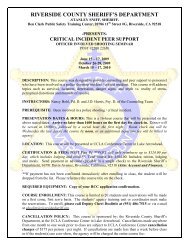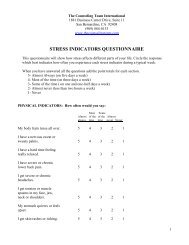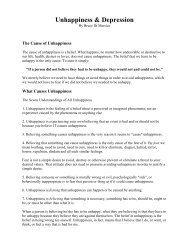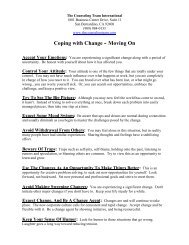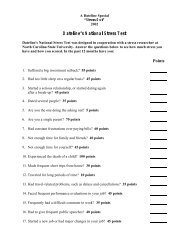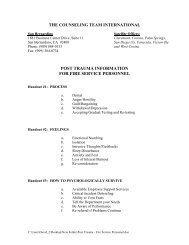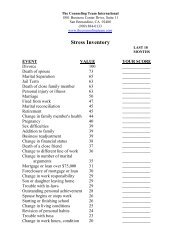Stress Management Packet - The Counseling Team International
Stress Management Packet - The Counseling Team International
Stress Management Packet - The Counseling Team International
Create successful ePaper yourself
Turn your PDF publications into a flip-book with our unique Google optimized e-Paper software.
<strong>Stress</strong><br />
<strong>Management</strong><br />
Prepared by:<br />
<strong>The</strong> <strong>Counseling</strong> <strong>Team</strong> <strong>International</strong><br />
www.thecounselingteam.com<br />
Headquarters<br />
1881 Business Center Drive, Suite 11<br />
San Bernardino, CA 92408<br />
Phone: (800) 222-9691<br />
Fax: (909) 384-0734<br />
With Satellite offices located in: Corona, Palm Springs,<br />
San Diego (2), Temecula, Victorville & West Covina
STRESS INDICATORS QUESTIONNAIRE<br />
This questionnaire will show how stress affects different parts of your life. Circle the response<br />
which best indicates how often you experience each stress indicator during a typical week.<br />
When you have answered all the questions add the point totals for each section.<br />
5- Almost Always (on five days a week)<br />
4- Most of the time (on three days a week)<br />
3- Some of the time ( on one and one-half days a week)<br />
2- Almost never (less than two hours a week)<br />
1- Never<br />
PHYSICAL INDICATORS: How often would you say:<br />
Most Some<br />
Almost of the of the Almost<br />
always time time never Never<br />
My body feels tense all over. 5 4 3 2 1<br />
I have a nervous sweat or<br />
sweaty palms. 5 4 3 2 1<br />
I have a hard time feeling<br />
really relaxed. 5 4 3 2 1<br />
I have severe or chronic<br />
lower back pain. 5 4 3 2 1<br />
I get severe or chronic<br />
headaches. 5 4 3 2 1<br />
I get tension or muscle<br />
spasms in my face, jaw,<br />
neck or shoulders. 5 4 3 2 1<br />
My stomach quivers or feels<br />
upset. 5 4 3 2 1<br />
I get skin rashes or itching. 5 4 3 2 1<br />
I have problems with my<br />
bowels (constipation,<br />
diarrhea). 5 4 3 2 1
I need to urinate more than<br />
most people. 5 4 3 2 1<br />
My ulcer bothers me. 5 4 3 2 1<br />
I feel short of breath after<br />
mild exercise like climbing<br />
up four flights of stairs. 5 4 3 2 1<br />
Compared to most people,<br />
I have a very small or a<br />
very large appetite. 5 4 3 2 1<br />
My weight is more than 15<br />
pounds higher than what is<br />
recommended for a person my<br />
height and build. 5 4 3 2 1<br />
I smoke tobacco. 5 4 3 2 1<br />
I get sharp chest pains when<br />
I'm physically active. 5 4 3 2 1<br />
I lack physical energy. 5 4 3 2 1<br />
When I'm resting, my heart<br />
beats more than 100 times<br />
a minute. 5 4 3 2 1<br />
Because of my busy schedule<br />
I miss at least two meals<br />
during the week. 5 4 3 2 1<br />
I don't really plan my meals<br />
for balanced nutrition. 5 4 3 2 1<br />
I spend less than 3 hours<br />
a week getting vigorous<br />
physical exercise (running,<br />
playing basketball, tennis,<br />
swimming, etc). 5 4 3 2 1<br />
Physical Indicators Point total __________
SLEEP INDICATORS: How often would you say:<br />
I have trouble falling<br />
asleep. 5 4 3 2 1<br />
I take pills to get to sleep. 5 4 3 2 1<br />
I have nightmares or repeated<br />
bad dreams. 5 4 3 2 1<br />
I wake up at least once in<br />
the middle of the night for<br />
no apparent reason. 5 4 3 2 1<br />
No matter how much sleep I<br />
get, I awake feeling tired. 5 4 3 2 1<br />
Sleep Indicators Point Total __________<br />
BEHAVIORAL INDICATORS: How often would you say:<br />
I stutter or get tongue tied<br />
when I talk to other people. 5 4 3 2 1<br />
I try to work while I'm<br />
eating lunch. 5 4 3 2 1<br />
I have to work late. 5 4 3 2 1<br />
I go to work even when I<br />
feel sick. 5 4 3 2 1<br />
I have to bring work home. 5 4 3 2 1<br />
I drink alcohol or use<br />
drugs to relax. 5 4 3 2 1<br />
I have more than two beers,<br />
eight ounces of wine or<br />
three ounces of hard<br />
liquor a day. 5 4 3 2 1
When I drink, I like to get<br />
really drunk. 5 4 3 2 1<br />
I get drunk or "high" with<br />
other drugs more than once a<br />
week. 5 4 3 2 1<br />
When I'm feeling high from<br />
alcohol or drugs I will<br />
drive a motor vehicle. 5 4 3 2 1<br />
I tend to stumble when<br />
walking, or have more<br />
accidents than other people. 5 4 3 2 1<br />
In any given week, I take<br />
at least one prescription<br />
drug without the recommendation<br />
of a physician,<br />
e.g. amphetamines,<br />
barbiturates. 5 4 3 2 1<br />
I have problems with my<br />
sex life. 5 4 3 2 1<br />
At least once during the<br />
week I will make bets for<br />
money. 5 4 3 2 1<br />
After dinner I spend more time<br />
alone or watching TV than I<br />
do talking with my family<br />
or friends. 5 4 3 2 1<br />
I arrive at work late. 5 4 3 2 1<br />
At least once during the<br />
week I have a shouting match<br />
with a co-worker or supervisor. 5 4 3 2 1<br />
Behavioral Indicators Point Total __________
EMOTIONAL INDICATORS: How often would you say:<br />
Most Some<br />
Almost of the of the Almost<br />
always time time never Never<br />
I have found the best way<br />
to deal with hassles and<br />
problems is to consciously<br />
avoid thinking or talking<br />
about them. 5 4 3 2 1<br />
I have trouble remembering<br />
things. 5 4 3 2 1<br />
I feel anxious or frightened<br />
about problems I can't really<br />
describe. 5 4 3 2 1<br />
I worry a lot. 5 4 3 2 1<br />
It is important for me not<br />
to show my emotions to my<br />
to my family. 5 4 3 2 1<br />
It is hard for me to relax<br />
at home. 5 4 3 2 1<br />
It's best if I don't tell<br />
even my closest friend how<br />
I'm really feeling. 5 4 3 2 1<br />
I find it hard to talk<br />
when I get excited. 5 4 3 2 1<br />
I feel very angry inside. 5 4 3 2 1<br />
I have temper outbursts I<br />
can't control. 5 4 3 2 1<br />
When people criticize me,<br />
even in friendly,<br />
constructive way, I feel<br />
offended. 5 4 3 2 1
I feel extremely sensitive<br />
and irritable. 5 4 3 2 1<br />
My emotions change<br />
unpredictably and without<br />
any apparent reason. 5 4 3 2 1<br />
I feel like I really can't<br />
trust anyone. 5 4 3 2 1<br />
I feel like other people<br />
don't understand me. 5 4 3 2 1<br />
I really don't feel good<br />
about myself. 5 4 3 2 1<br />
Generally I am not<br />
optimistic about my future. 5 4 3 2 1<br />
I feel very tired and<br />
disinterested in life. 5 4 3 2 1<br />
Impulsive behavior has<br />
caused me problems. 5 4 3 2 1<br />
I have felt so bad that I<br />
thought of hurting myself. 5 4 3 2 1<br />
When I have an important<br />
personal problem I can't<br />
solve myself, I do not seek<br />
professional help. 5 4 3 2 1<br />
Emotional Indicator Point Total __________
PERSONAL HABITS: How often would you say:<br />
I spend less than three<br />
hours a week working on a<br />
hobby of mine. 5 4 3 2 1<br />
I spend less than one<br />
hour a week writing personal<br />
letters, writing in a diary<br />
or writing creatively. 5 4 3 2 1<br />
I spend less than 30 minutes<br />
a week talking casually with<br />
my neighbors. 5 4 3 2 1<br />
I lack time to read the<br />
daily newspaper. 5 4 3 2 1<br />
I watch television for<br />
entertainment more than one<br />
hour a day. 5 4 3 2 1<br />
I drive in a motor vehicle<br />
faster than the speed limit<br />
for the excitement and<br />
challenge of it. 5 4 3 2 1<br />
I spend less than 30 minutes<br />
a day working toward a life<br />
goal or ambition of mine. 5 4 3 2 1<br />
My day to day living is not<br />
really affected by my<br />
religious beliefs or my<br />
philosophy of life. 5 4 3 2 1<br />
When I feel stressed, it is<br />
difficult for me to plan time<br />
and activities to constructively<br />
release my stress. 5 4 3 2 1<br />
Personal Habits Point Total __________
No single question in this questionnaire proves you are experiencing stress, but by looking at the<br />
results of groups of questions, it may be possible to define what areas of you life stress affects the<br />
most. To determine these areas, add the circled numbers in each section and mark the point total for<br />
each section with an "X" on the appropriate dotted line below.<br />
PERSONAL STRESS LEVELS<br />
Very Medium High Very Danger<br />
Low<br />
High<br />
Physical Indicators<br />
Point Total 22........30.......38......48........54+<br />
Sleep Indicators<br />
Point Total 5.........8........10......12........14+<br />
Behavior Indicators<br />
Point Total 18........27.......36......45........50+<br />
Emotional Indicators<br />
Point Total 21........29.......37......46........55+<br />
Personal Habits<br />
Point Total 9.........15.......20......25........30+<br />
Note the areas where you showed "very high" or "danger" levels of stress. <strong>The</strong>se are problem areas<br />
you should focus on when you develop your Personal <strong>Stress</strong> <strong>Management</strong> Plan later in the course. If<br />
you have no points totals in the "very high" or "danger" zones, congratulations- you are doing a very<br />
good job of managing stress. In your Personal <strong>Stress</strong> <strong>Management</strong> plan, focus on:<br />
1) building stress resources and 2) stress prevention through aerobic exercise, relaxation, nutrition<br />
and sleep.<br />
- Early Warning Signs<br />
On the lines below, write the three signs which occur earliest and most regularly when you're under<br />
stress. You may want to look back at your questionnaire to get an idea of what your early warning<br />
signs are. <strong>The</strong>se signs give advance notice of being stressed and allow you to identify what causes<br />
you stress, and to take action before serious problems result.<br />
1. ______________________________________________________________<br />
2. ______________________________________________________________<br />
3. ______________________________________________________________<br />
Date Questionnaire Completed_______________________________________<br />
(Keep this completed questionnaire for your future use)
Health: <strong>The</strong> American Way<br />
An estimated 63 million Americans have some form of major heart or blood vessel disease.<br />
An estimated 1.5 million have heart attacks each year.<br />
Of those, 550,000 (including 200,000 between ages 45 and 65) die.<br />
Complications of arteriosclerosis account for about 1/2 of all deaths (1/3 between ages<br />
35-65).<br />
About 58 million Americans have hypertension (high blood pressure).<br />
Approximately 60,000 die each year of hypertension, not counting those whose high blood pressure<br />
precipitates a heart attack or stroke.<br />
An estimated 8-10 million Americans have ulcers.<br />
As many as 10,000 die each year of hemorrhages of abdominal perforations that result from peptic<br />
ulcers.<br />
Approximately 4.5 million Americans suffer from migraine headaches at some time.<br />
Alcoholism affects at least 10 million Americans and causes at least 200,000 deaths each year.<br />
Approximately 8 million are diabetics.<br />
Americans consume 16,000 tons of aspirin each year, at an expenditure of 500 million dollars.<br />
More than 1.5 billion prescriptions are filled each year, including 61 million doses of tranquilizers<br />
and 33 million doses of anti-depressants.<br />
Urban dwellers have more stress-related illnesses than rural dwellers.<br />
Parents of young children report more feelings of pressure and stress than any other age or maritalstatus<br />
group.
How <strong>Stress</strong>ful Is Your Diet???<br />
Use the following checklist of healthy anti-stress food choices and eating patterns to see how your<br />
diet measures up.<br />
Relaxed, pleasant mealtime<br />
Breakfast eaten daily<br />
2-3 servings of low fat protein foods daily (fish, poultry, lean meat, dried beans and peas)<br />
High fat meats are seldom eaten (bacon, sausage, luncheon meats, fried chicken, steak,<br />
corned beef, etc.)<br />
A minimum of 6 servings of bread, cereal, pasta, or grains daily<br />
At least half of the breads and cereals are whole grain varieties<br />
Two to four servings of lowfat or nonfat milk products daily<br />
At least four servings of fruits and vegetables daily<br />
Majority of fruit and vegetable servings are fresh or frozen<br />
One or two fruit and vegetable servings are high in vitamin C such as orange, grapefruit,<br />
broccoli, strawberries, tomatoes or guava<br />
One fruit or vegetable serving is high in bete carotene (the plant from vitamin A), such as<br />
yams, carrots, spinach, broccoli or asparagus<br />
Intake of added fats is low; butter, margarine, gravy, cream, non-dairy creamer, shortenings,<br />
salad dressings, etc.<br />
Caffeine intake is low to moderate (no more than two cups daily)<br />
Sugar intake is low (table sugar, honey, syrup, candy, donuts, etc.)<br />
Fluid intake (excluding coffee and alcohol) is at least 6-8 glasses daily.
STRESS INVENTORY<br />
LAST 18 MONTHS<br />
EVENT VALUE YOUR SCORE<br />
Divorce 100<br />
Death of spouse 73<br />
Marital Separation 65<br />
Jail term 63<br />
Death of close family member 63<br />
Personal injury or illness 63<br />
Marriage 50<br />
Fired from work 47<br />
Marital reconciliation 45<br />
Retirement 45<br />
Change in family member's health 44<br />
Pregnancy 40<br />
Sex difficulties 39<br />
Addition to family 39<br />
Business readjustment 39<br />
Change in financial status 38<br />
Death of a close friend 37<br />
Change to different line of work 36<br />
Change in number of marital<br />
arguments 35<br />
Mortgage or loan over $100,000 31<br />
Foreclosure of mortgage or loan 30<br />
Change in work responsibility 29<br />
Son or daughter leaving home 29<br />
Trouble with in-laws 29<br />
Outstanding personal achievement 28<br />
Spouse begins or stops work 26<br />
Starting or finishing school 26<br />
Change in living conditions 25<br />
Revision of personal habits 24<br />
Trouble with boss 23<br />
Change in work hours, condition 20<br />
Change in residence 20<br />
Change in schools 20<br />
Change in recreational habits 19<br />
Change in church activities 19<br />
Change in social activities 18<br />
Mortgage or loan under $100,000 17<br />
Change in sleeping habits 16
LAST 18 MONTHS<br />
EVENT VALUE YOUR SCORE<br />
Change in number of family<br />
gatherings 15<br />
Change in eating habits 15<br />
Vacation 13<br />
Christmas Season 12<br />
Minor violation of the law 11<br />
TOTAL<br />
(From Thomas H. Holmes, M.D., "Social Readjustment Rating Scale.")<br />
THE STRESS OF ADJUSTING TO CHANGE<br />
<strong>The</strong> list you just scored are events in life which have been found to produce individual stress<br />
reactions in a cross section study conducted by Dr. Thomas H. Holmes at the University of<br />
Washington. <strong>The</strong> scale value of each event reflects the amount of stress and disruption they cause<br />
in the life of the average person's life. If your total score is less than 150 your chance of getting sick<br />
in the next two years is 37%, a score of 150 - 300 raises the odds to 51%; with a score of more than<br />
300 points, your chances of illness rises to 80% and continues to increase as your score goes up.<br />
Remember, these figures are of possible illness, not certain illness.
Personal Plan To Prevent Or Alleviate <strong>Stress</strong><br />
Three sources of stress that affect me:<br />
1.<br />
2.<br />
3.<br />
Three strengths or experiences I can utilize to prevent or alleviate stress:<br />
1.<br />
2.<br />
3.<br />
Three methods/techniques I can implement in my daily life to prevent or alleviate stress:<br />
1.<br />
2.<br />
3.<br />
Three ways I can evaluate if my personal plan to prevent or alleviate stress is effective for me:<br />
1.<br />
2.<br />
3.<br />
Date I intend to implement my personal plan:
Effective Time <strong>Management</strong><br />
Barriers to Effective Time <strong>Management</strong><br />
1. Over commitment – can’t say no N S T<br />
2. Values and objectives not clarified. N S T<br />
3. Role not properly defined. N S T<br />
4. Baggage from past experience. N S T<br />
5. Unusual family expectations. N S T<br />
6. Physical illness. N S T<br />
7. Telephone interruptions. N S T<br />
8. Failure to delegate. N S T<br />
9. Poor T.V. planning. N S T<br />
10. Wasted commuting time. N S T<br />
11. Traditions of the office, e.g., millions of meetings. N S T<br />
12. Assumption that this state is a temporary condition. N S T<br />
13. Life controlled by boss or spouse/significant other. N S T<br />
14. Protestant ethic – ―keeping busy.‖ N S T<br />
15. Crisis management. N S T<br />
TOTAL<br />
No Control (N)______________<br />
Some Control (S)____________<br />
Total Control (T)____________
Things I Love To Do<br />
List 20 things you love to do. <strong>The</strong>y can be big or little things in your life; things appealing to the<br />
senses or more abstract pleasures; things you've always enjoyed or relatively new experiences;<br />
things that you do or that others do for you: things done indoors or outdoors, at night or during the<br />
day, or in different seasons of the year. Be as specific as you can. Instead of listing "sports" write<br />
"watching football on TV" or "playing tennis with Joyce".<br />
This is your list: Put down whatever comes to mind without judging it or<br />
wondering what others would think about it. <strong>The</strong>re are no right or wrong<br />
answers. You may have more or less than 20 items.<br />
1. ________________________________________________________________<br />
2. ________________________________________________________________<br />
3. ________________________________________________________________<br />
4. ________________________________________________________________<br />
5. ________________________________________________________________<br />
6. ________________________________________________________________<br />
7. ________________________________________________________________<br />
8. ________________________________________________________________<br />
9. ________________________________________________________________<br />
10.________________________________________________________________<br />
11.________________________________________________________________<br />
12.________________________________________________________________<br />
13.________________________________________________________________<br />
14.________________________________________________________________<br />
15.________________________________________________________________<br />
16.________________________________________________________________<br />
17.________________________________________________________________<br />
18.________________________________________________________________<br />
19.________________________________________________________________<br />
20.________________________________________________________________<br />
Now circle the five that are your favorites
Breathing Exercises<br />
Practice these initial exercises to control tension. <strong>The</strong>y may, or may not, be enough. Try each one 3<br />
times a day for a week. As with most things, doing something just one or two times will not<br />
produce much noticeable change. You will probably feel most comfortable with one of the three<br />
exercises. Pick a quiet spot each day. Concentrate on the exercise and shut out any distractions.<br />
Get into a comfortable position before starting any exercise.<br />
EXERCISE #1: 1 TO 8 Count<br />
Take a deep, slow breath and close your eyes. Exhale fully and completely, making sure to get the<br />
last bit of air out of your lungs. Breathe in again. As you inhale, imagine the number 1 in your<br />
mind; at the same time, focus on the inhalation. Hold you breath for three seconds. Exhale, and as<br />
you breathe out the air fully and completely, mentally say 2 and visualize the number two in your<br />
mind. Breathe in again and mentally say 3 focusing on the three and on the inhalation. Hold your<br />
breath for three seconds. Exhale fully and completely, while mentally visualizing and saying 4.<br />
Inhale, saying 5, exhale saying 6. Remember to visualize the number and focus on the inhalation.<br />
Inhale, counting 7 and exhale counting 8. Repeat the entire sequence from 1 to 8. Slowly open<br />
your eyes.<br />
Do you feel calmer?<br />
Did you have any difficulty visualizing the numbers?<br />
Were you able to focus in the inhalation?<br />
Did you finish the exercise?<br />
If you had any trouble on the inhalation or visualizing the numbers, clear your mind of any<br />
distractions and try again. You might have been trying too hard if you didn't finish the exercise.<br />
This exercise is not a race. Learn to be patient with yourself and the exercise. Breathe slowly and<br />
pause between breaths. Do not try to force relaxation— this will only make it harder for you to relax<br />
and you may find this very frustrating. Instead, find a way to give into relaxation.
EXERCISE #2: Three-Part Breathing<br />
Take a deep breath. Imagine that your lungs are divided into three parts. Visualize the lowest part<br />
of your lungs filling with air. Use only your diaphragm; your chest should remain relatively still.<br />
Imagine the middle part of you lungs filling, and as you visualize the expansion, allow your rib cage<br />
to move slightly forward. Visualize the upper part filling with air and your lungs becoming<br />
completely full. Your shoulders will rise slightly and move backwards. Exhale fully and<br />
completely. As you empty your upper lungs, drop your shoulders slightly. Visualize the air leaving<br />
the middle portion of your lungs, and feel your rib cage contract. Pull in your abdomen to force out<br />
the last bit of air from the bottom of your lungs.<br />
-Repeat this exercise four times.<br />
-Did you have any trouble visualizing your lungs expanding and contracting?<br />
-Were you able to complete the inhaling visualization before you started to exhale?<br />
If you had trouble visualizing, take a moment to clear your mind of thoughts. You can get back to<br />
them later when you are calm and relaxed. <strong>The</strong> visualization may seem more complex to you than it<br />
actually is. If you found yourself exhaling while still visualizing the inhalation, try to inhale more<br />
slowly. Be sure to exhale completely and push all of the carbon dioxide out of your lungs. This<br />
allows more room for life-giving oxygen to fill your lungs when you inhale.<br />
EXERCISE #3: Alternate Nostril Breathing<br />
Once you are comfortable with THREE PART BREATHING try this more advanced exercise.<br />
Place your right forefinger over your right nostril, pressing lightly to close off the nostril. Take a<br />
deep, full breath, inhaling with your left nostril. Visualize your lungs filling fully and expanding<br />
completely. Remove your finger from the right nostril and lightly closed off the left nostril. Exhale<br />
slowly through the open right nostril. Be certain to exhale fully and completely.<br />
Begin the sequence again by inhaling fully and completely through the left nostril.<br />
-Repeat slowly and rhythmically for ten more breaths.<br />
-Did you find it difficult to breath through your nose?<br />
-Did you find one nostril easier to breathe through than the other?<br />
If you repeat this exercise at different times during the day, you will find that sometimes it is easier<br />
to breath through the right nostril, and sometimes the left. This happens because your primary<br />
breathing nostril actually changes about every four hours. <strong>The</strong> exercise will make you more aware<br />
of the changes in your breathing patterns.
EXERCISE #2: Three-Part Breathing<br />
Take a deep breath. Imagine that your lungs are divided into three parts. Visualize the lowest part<br />
of your lungs filling with air. Use only your diaphragm; your chest should remain relatively still.<br />
Imagine the middle part of you lungs filling, and as you visualize the expansion, allow your rib cage<br />
to move slightly forward. Visualize the upper part filling with air and your lungs becoming<br />
completely full. Your shoulders will rise slightly and move backwards. Exhale fully and<br />
completely. As you empty your upper lungs, drop your shoulders slightly. Visualize the air leaving<br />
the middle portion of your lungs, and feel your rib cage contract. Pull in your abdomen to force out<br />
the last bit of air from the bottom of your lungs.<br />
-Repeat this exercise four times.<br />
-Did you have any trouble visualizing your lungs expanding and contracting?<br />
-Were you able to complete the inhaling visualization before you started to exhale?<br />
If you had trouble visualizing, take a moment to clear your mind of thoughts. You can get back to<br />
them later when you are calm and relaxed. <strong>The</strong> visualization may seem more complex to you than it<br />
actually is. If you found yourself exhaling while still visualizing the inhalation, try to inhale more<br />
slowly. Be sure to exhale completely and push all of the carbon dioxide out of your lungs. This<br />
allows more room for life-giving oxygen to fill your lungs when you inhale.<br />
EXERCISE #3: Alternate Nostril Breathing<br />
Once you are comfortable with THREE PART BREATHING try this more advanced exercise.<br />
Place your right forefinger over your right nostril, pressing lightly to close off the nostril. Take a<br />
deep, full breath, inhaling with your left nostril. Visualize your lungs filling fully and expanding<br />
completely. Remove your finger from the right nostril and lightly closed off the left nostril. Exhale<br />
slowly through the open right nostril. Be certain to exhale fully and completely.<br />
Begin the sequence again by inhaling fully and completely through the left nostril.<br />
-Repeat slowly and rhythmically for ten more breaths.<br />
-Did you find it difficult to breath through your nose?<br />
-Did you find one nostril easier to breathe through than the other?<br />
If you repeat this exercise at different times during the day, you will find that sometimes it is easier<br />
to breath through the right nostril, and sometimes the left. This happens because your primary<br />
breathing nostril actually changes about every four hours. <strong>The</strong> exercise will make you more aware<br />
of the changes in your breathing patterns.
Common Sense For <strong>Stress</strong> <strong>Management</strong><br />
1. Eat three meals a day, including breakfast.<br />
2. Avoid sugar, salt, animal fat, and processed white flour.<br />
3. Pursue regular program of physical exercise or other leisure pastime.<br />
4. Nurture and maintain friendships.<br />
5. Get enough sleep (6 to 8 hours).<br />
6. Practice abdominal breathing and relaxation.<br />
7. Schedule time and activities alone, and with others to maintain a well-rounded life style.<br />
8. Stop smoking.<br />
9. Limit alcohol (one drink with meals) and caffeine intake.<br />
10. Pace yourself and allow for an even flow of demands.<br />
11. Identify and accept emotional needs.<br />
12. Recognize early warnings.<br />
13. Allocate time and energy to allow for stimulation.<br />
14. Take appropriate supplements, if needed, for proper nutrition.<br />
15. Avoid self-medication.<br />
16. Take one thing at a time.<br />
17. Give in once in while.<br />
18. Talk out your worries.<br />
19. Make yourself available.<br />
20. Learn to accept the things you cannot change.
Ways of Combating Job <strong>Stress</strong><br />
Here are some ways to cope with job stress you might consider trying. Begin with the easier and<br />
simpler ones to get a feel for how it works and to establish a pattern of success. As a wise man once<br />
said, "Nothing Predicts Success Like Success". By setting up a reasonable and achievable goals,<br />
you will be more likely to keep with it and also more likely to move on to a higher goal level.<br />
1. Start each day with breakfast. Eat at home if possible because you'll probably eat better. If<br />
not, you might try meeting a friend for breakfast--allow time to enjoy it.<br />
2. If you are used to drinking caffeinated beverages throughout the day, cut down. Try<br />
decaffeinated coffee or soda, fruit juice or water.<br />
3. Organize your work. Setting priorities and reasonable goals helps things to seem, and<br />
actually be, more manageable.<br />
4. Write things down. Why over-burden your memory with trivial things?<br />
5. Don't try to be perfect. <strong>The</strong>re are some things worth doing that aren't worth doing well.<br />
6. Seek to concentrate on one task at a time, finish it, and move on to the next task. If you are<br />
working on something and come to a place where you can go no farther at that time, set it<br />
aside and move on. <strong>The</strong> key here is to keep moving towards completion and to avoid<br />
dwelling on factors over which you have no control.<br />
7. If possible, reduce the noise level in your immediate surroundings. Noise can often be a<br />
source of controllable stress.<br />
8. Seek to establish uninterrupted blocks of time to work on specific tasks. You will find that<br />
you get more accomplished, you will feel more relaxed, and the final product will have a<br />
"tighter" feel to it.<br />
9. Create as pleasant a work environment as possible. Surround yourself with objects that help<br />
you to feel good about yourself and where you are.<br />
10. Avoid taking your job with you when you take a break.<br />
11. Take up meditation and do a 10-20 minute meditation morning and afternoon for your break.
12. Optimize your health with good nutrition, exercise, sleep, and rest.<br />
13. Monitor your work-rest-recreation balance. Are things out of balance? Do you need to<br />
make some adjustments?<br />
14. Reduce your consumption of alcohol, and if you smoke, QUIT!!!<br />
15. Take up a regular aerobic activity such as racquetball, running, or rowing and do it four days<br />
each week.<br />
16. Avoid excuses for NOT doing any of the above. It is often easier to find reasons not to do,<br />
than it is reasons to do, something.<br />
While these activities will not eliminate the stress related to your job, they can and will help in<br />
controlling the effects of stress. When that happens, you will be in a better position and frame of<br />
mind to focus on the primary job at hand:<br />
STAYING ALIVE!
Coping Strategies<br />
"Most people are about as happy as they make their minds up to be."<br />
Abraham Lincoln<br />
A. <strong>Stress</strong> management is a decision-making process. When we are feeling the effects of<br />
a stressful lifestyle, we have three major ways we could deal with that stress:<br />
- Alter it<br />
- Avoid it or<br />
- Accept it by<br />
building our resistance or<br />
changing our perception<br />
* All three of these approaches can be effective coping techniques. <strong>The</strong> trick is<br />
choosing the proper approach for the situation at hand and the person involved.<br />
* Alter which implies removing the source of stress by changing something.<br />
Problem-solving, direct communication, organizing, planning and time management<br />
are common techniques for altering.<br />
* Avoid which implies removing oneself from the stressful situation or figuring out<br />
how not to get there in the first place!<br />
* Accept which involves equipping oneself physically and mentally for stress.<br />
* b stands for building resistance.<br />
People can increase their capacity to tolerate stress physically through proper diet,<br />
regular aerobic exercise and systematic relaxation techniques. Relaxation and<br />
exercise provide the double bonus of releasing stored up tension as well! Mental<br />
resistance is bolstered through positive affirmation, taking time for mental health,<br />
and getting clear about goals/values/priorities. Social resistance is strengthened by<br />
building and maintaining support systems, investing in relationships, clear<br />
communication and intimacy. Spiritual resistance is especially important in times of<br />
high stress. Meditation, prayer, worship, faith and commitment strengthen people.<br />
* c stands for change<br />
One way to Accept stress is to change the way you perceive the situation or yourself.<br />
Changing unrealistic expectations and irrational beliefs such as "I should succeed at<br />
everything I try," or "it would be awful if my spouse were angry with me," is a good<br />
start. Building self-esteem and cultivating a positive attitude help as well.<br />
Redefining the situation in a less stress-provoking way is always an option-when<br />
people play "isn’t it funny" or "isn’t it grand" instead of "isn’t it aw ful," their stress<br />
resistance increases.<br />
* <strong>Stress</strong> is a product of our interaction with the world. Our environment provides<br />
us with many challenges, changes and demands. None of these are, by themselves,
stressful.<br />
* Our beliefs about the world and ourselves, our feelings, and our assessment or<br />
our coping resources act as a perceptual filter through which we view the world.<br />
It is our very own perceptual filter that triggers a stress reaction.<br />
EVENT A PERCEPTUAL RESPONSE C<br />
FILTER B<br />
Pressures Past experience Psychophysical stress response<br />
Demands Expectations Burnout<br />
Changes Evaluation Effective coping mechanism<br />
Challenges Beliefs<br />
Some slight common errors of thinking are:<br />
- Black-or-white thinking: Any performance short of perfection is a total failure.<br />
- Over generalization: Seeing one negative event as a never-ending pattern of defeat.<br />
- Disqualifying the positive: Rejecting positive experiences by insisting they "don't<br />
count."<br />
- Catastrophizing: Exaggerating the importance of errors or problems.<br />
- "Should" statements: Trying to motivate yourself to improve with "shoulds" and<br />
"shouldn'ts."<br />
- Self-labeling: An extreme form of over generalization; instead of saying "I made a<br />
mistake," the person attaches a negative label, i.e., "I am a loser."<br />
- Personalization: Blaming yourself inappropriately as the cause of a negative event.<br />
- Reflect on the things that you say about an event just after something difficult or<br />
stressful takes place, and think about how realistic and helpful it is for you to come to<br />
such conclusions.
RULES TO PROMOTE RATIONAL THINKING<br />
* It doesn't do anything to me.<br />
* Everything is exactly the way it should be.<br />
* All humans are fallible creatures.<br />
* It takes two to have a conflict.<br />
* <strong>The</strong> original cause is lost in antiquity.<br />
* We feel the way we think.
Institute For Creative Aging<br />
―If I had m y life to live over, I’d try to m ake m ore m istakes next tim e.<br />
I would limber up. I would be sillier than I have been this trip.<br />
I know of very few things I would take seriously. I would be crazier.<br />
I would be less hygienic.<br />
I would climb more mountains, swim more rivers and watch more sunsets.<br />
I would eat more ice cream and less beans.<br />
I would have more active troubles and fewer imaginary ones.<br />
You see, I am one of those people who lives life prophylactically and sensibly and<br />
sanely, hour after hour, day after day.<br />
Oh, I have had my moments, and if I had it to do over again,<br />
I’d have m ore of them .<br />
In fact, I’d try to have nothing else.<br />
Just moments, one after another,<br />
instead of living so many years ahead each day.<br />
I have been one of those people who never go anywhere<br />
without a thermometer, a hot-water bottle, a gargle,<br />
a raincoat and a parachute.<br />
If I had it to do over again, I would go places and<br />
do things and travel lighter that I have.<br />
If I had my life to live over, I would start barefooted<br />
earlier in the spring and stay that way later in the fall.<br />
I w ould play hooky m ore. I w ouldn’t m ake such<br />
good grades except by accident.<br />
I would ride on more merry-go-rounds.<br />
I’d pick m ore daises.‖



